#house schwarzenberg
Note
First of all: as someone who would also love some weird/obscure books that aren’t YA, when you have a list would you be comfortable posting the recs you’ve gotten?
Secondly:
Hag-Seed, by Margaret Atwood. Retelling of Shakespeare’s Tempest. Really good.
American Gods, Neil gaiman. Long, kind of dense, good fantasy.
Stories, a short story collection edited by Neil Gaiman and Al Sarrantonio.
Hamnet, Maggie O’Farrell
Watership Down, Richard Adams
The Long Way to a Small, Angry Planet, Becky Chambers
The Haunting of Hill House, Shirley Jackson
The Female Persuasion, Meg Wolitzer
Drive Your Plow over the Bones Of the Dead, Olga Tokarczuk
People of the Book, Geraldine brooks
Dogsbody, Dianna Wynne Jones
The Alchemist, Paulo Coelho
World War Z, Max Brooks (no really)
The Name of the Wind, Patrick Rothfuss—I’m genuinely unsure if this one counts as YA or not, but I came to it as an adult reader well past my YA phase and loved it, and it does not “feel” like a YA novel, so I’m including it. I’ll warn that it is the first of two books published in a proposed trilogy, and the third one has been stalled for like ten years, but genuinely I think it is worth a read even if the trilogy is never finished.
Ladies of the Rachmaninoff Eyes, Henry van Dyke—I read this recently when I got it in a subscription box that focuses on reprints of older, out of print books the editors think deserve more circulation than they’ve gotten. I enjoyed it. Ex-Wife by Ursula Parrott was in the same box, though I haven’t read that one yet.
Ah sorry, your ask must have slipped past me in my notifs! I don't really have a list but almost everyone added their recs in the notes, so you can find all of them there.
Out of those, I just read Schwarzenberg by Stefan Heym. It might be a bit dry for some people but it was just right up my alley and I will be thinking about it for some time for sure. And currently I am reading Perdido Street Station by China Miévielle. Final judgement is still pending but it does fall into the vague genre category of Weird Fiction and so far I like it.
And thanks for your recs of course!
21 notes
·
View notes
Text
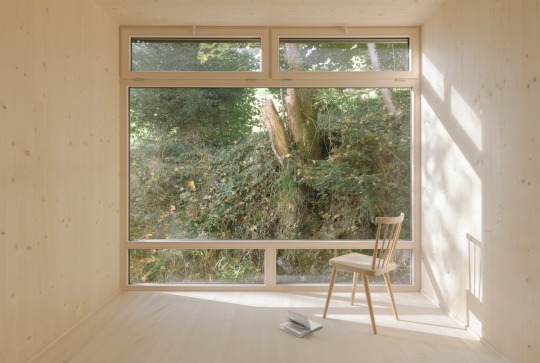
House Heuberg is a minimalist home located in between the Bödelestraße and the threshold to Schwarzenberg, Austria, designed by Innauer Matt Architekten. Surrounded by a natural tapestry of trees and underbrush, this site was originally designated for a summer house in the 1970s, which, however, was never realized.
15 notes
·
View notes
Text
My relations with the Duke of Reichstadt (1/?)
Hey, guys! First of all, happy Murat day!
I know it's a bit contradictory that I'm posting King of Rome content on Murat's birthday, but I can't let go that the King of Rome's bday was the 20th! I wanted to draw something to celebrate it, but instead, I'll leave you with these memories of his best friend; Count Anton Prokesch-Osten about him. Please, forgive some misspelling you could find, since nor german, french or english are my native language! This text was translated from the german to the french, and so, I translate this to the english for you! Hope you enjoy it!
For some context, the King of Rome/Napoleon II is living in Vienna (he started living there at the age of three) at the time this takes place. They refer to him by his title (Duke of Reichstadt) or by "Franz".

The Duke of Reichstadt was then for me, as well as for all circles of Viennese society, one of those appearances that were as attractive as they were endearing. However, I hadn't had a chance to get close to him until then. Now, precisely around this time, my destiny took me to Trieste, then in the midst of the battles where Greece shed its blood in floods on the mainland and on the islands, finally to Constantinople, in Asia Minor, Syria, Egypt and Nubia. After six years of absence, I returned to my native land, where I found a welcome full of kindness and consideration. At that time, when no steamboat had yet sailed the seas of the Levant, voyages to such distant lands, participation in events which, like the struggles of the Greeks against the Turks, had the privilege of exciting minds to the point of higher, they were considered almost as a merit, and reflected a certain brilliance in whoever had achieved them. My native city, Gratz, gave me a particularly flattering reception, when in June 1830, I went there for a few weeks to see relatives and friends, as well as to find these places still filled with the sweetest memories and that had been the theater of my early youth.
At the same time the court also came to reside at Gratz, and on the 22nd of the same month, I had the honor of being invited to the imperial table; placed in front of the Empress, I had the Duke of Reichstadt next to me, seated in front of the Emperor. This handsome and noble young man with deep blue eyes, a masculine forehead, abundant blond hair, silence on his lips, calm and self-possessed in all respects of him, made a truly extraordinary impression on me. I had a feeling similar to the one that comes over a teenager who first meets the young woman to whom he will give his heart. I only exchanged a few shy words with him the whole time we sat at the table; because the Empress and my former protector, Archduke John, were never tired of me telling them what I had seen and learned in foreign countries that we then considered so distant. Much better, after dinner they held me back for several more hours, and when I was finally allowed to retire, the Duke of Reichstadt barely had time to throw these few words at me:
"You've known me for a long time," and he squeezed my hand as if we were old friends.
This handshake was, in fact, a promise for the future. It could only have been given in this sense, and I did not attribute any other idea to it.
The next morning Count Maurice Dietrichstein, to whom the Duke's education was entrusted, came to my house. The count had shown me kindness from the moment that the favor of the princely house of Schwarzenberg had supported me. He reiterated the reproach already formulated the day before, namely, that, although he had been in the same city for a week, he had neglected the duke. The count offered to take me to the young prince at the same moment. I followed him with pleasure. At my entrance, the duke, whose attitude was not at all like that of the day before, rushed towards me with all the petulance of youth, his look animated and full of confidence. Repeating the words of the previous day, he exclaimed:
"You have known me and I have loved you for a long time. You defended my father's honor at a time when everyone was slandering him at will. I have read his memoirs on the Battle of Waterloo and, to better understand each line, I have translated them twice, first in French and then in Italian.”
I responded in terms inspired by the desire to bond closely with this handsome young man so neglected in this world.
Count Dietrichstein took the conversation to Greece. Expressing the most ardent wishes for prosperity for this people, who are now called to live their own lives again, already the day before, after having dinner with the imperial family, I supported the opinion that, despite the unfavorable conditions resulting from war, anarchy, factions, mismanagement, Greece, if given a prince of a European dynasty as king, and if its organization were not the work of diplomatic insufficiency, would move very rapidly towards a flourishing future. In the presence of Archduke Jean, Count Maurice, Colonel de Werklein, intendant of the Archduchess Maria Luisa, I, taking advantage of a moment when the Duke of Reichstadt was busy elsewhere, slipped into the course of the conversation the idea that the throne of Greece, devoid of claimants since the refusal of the Prince of Coburg, could not be handed over to a more worthy than the son of Napoleon: This proposal had received, to my surprise, general approval, The Empress herself, who, during this conversation had approached us, did not seem to oppose it. She had expressed this idea without yet knowing that they were the views of the Prince of Metternich; however, as early as 1825, I became aware of the statement made by this diplomat in St. Petersburg:
"One of two things: either the Greeks will again be subjected to Bonaparte, and given administrative autonomy; or an independent Greece will be constituted in such a way that it will not necessarily be Bonaparte's enemy."
However, Count Maurice had given me the chance to talk about Greece once more that morning, the duke soon guessed my thoughts and caught fire with my words. We were interrupted at that moment by the General Prince of (...). He wanted to say goodbye; however the duke insisted:
"The general," he told me, "he'll only stop for a moment, and I'd be very upset if I lost you soon."
I stayed. The Prince of (...) soon left, rebuffed by the duke's laconicism. So Count Dietrichstein brought up the conversation about Napoleon.
The duke spoke with high spirits. We could feel in each of his words the warmest admiration, the deepest attachment for his father; however, he preferred to rely on his military talents. To take him as a model and thus become a great captain, at this point he was all fire, all flame. We discussed several of the Emperor's maneuvers, including Austerlitz. I was surprised by the prince's strategic judgment and the precision of his expressions. Of all the officers and generals then at Gratz, there was, of course, not one who had the keenest military eye and was endowed with the most pronounced aptitude for command-in-chief. He returned not only to my published account of the Battle of Waterloo, but also to "the memorable events in the life of Field Marshal Prince Charles of Schwarzenberg.
The duke appreciated them with a sagacity that astonished me. Then he complained of his isolation, and poured out his soul in these words:
"Stay with me; sacrifice your future for me, stay with me! We are made to understand each other!"
He expressed himself with such warmth that he touched me to the bottom of my heart. Then he continued:
"If I am called to be another Prince Eugene for Austria, the question I ask myself is this: how will it be possible for me to prepare myself for this role? I feel indecisive in choosing a man capable of introducing me to the high demands and noble duties of the military career. I do not have and do not see any man of this merit in my entourage."
Count Dietrichstein witnessed this departure, and seemed to find it natural and fair. I reproached the duke, cordially shaking his hand, for judging too hastily. He accepted my guilt without taking offense and listened deferentially when I expressed the doubt he felt about my ability. Our interview was interrupted by the General Count of Leiningen, whom I could not refuse to receive. But, once again, he did not let me go, and as soon as the count left, he resumed the conversation about his father's feats of arms.
As it was necessary to pay my respects to his mother, the Archduchess Maria Luisa, I could hardly delay any longer; I warned him about it and said goodbye to him. I had been at the archduchess's for barely half an hour when the duke went there in the same manner. His mother received him tenderly; he kissed her with a rather serious air. The conversation focused on his childhood. He wanted her to give him more precise information about Colonel Sèves, who had accompanied him from Paris to Blois in March 1814, and whom he had met in April 1828 in Modon, at Ibrahim-Pasha's house. I had to tell him what the colonel had taught me about this fatal escape.
We perceived each other as two men who were convinced that nothing could separate them.
Source:
Mes relations avec le duc de Reichstadt : mémoire posthume / par le comte de Prokesch-Osten,. . . ; traduit de l’allemand [par A. de Prokesch-Osten fils]. Gallica. https://gallica.bnf.fr/ark:/12148/bpt6k6536278r/f38.item.zoom
#napoleon ii#klemens von metternich#l'aiglon#karl zu schwarzenberg#the king of rome#memoirs#anton prokesch-osten#duke of reichstadt
47 notes
·
View notes
Text

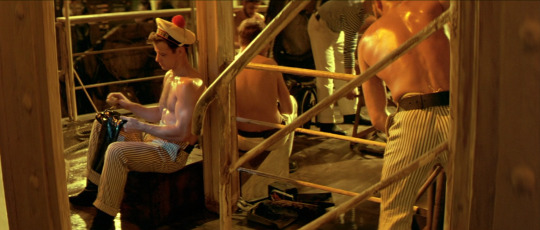
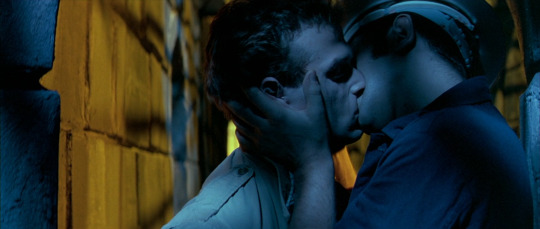
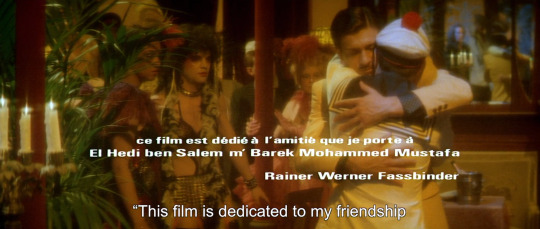


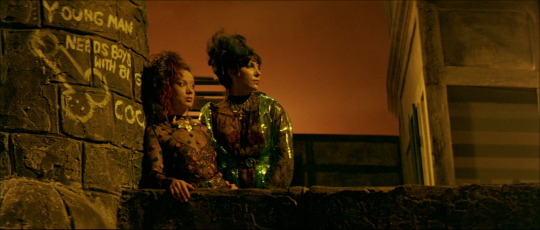
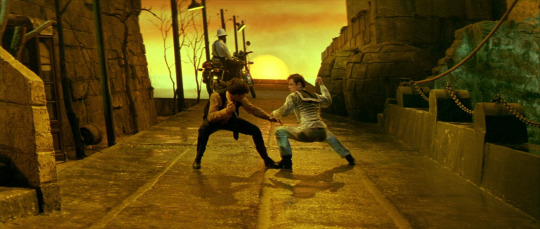


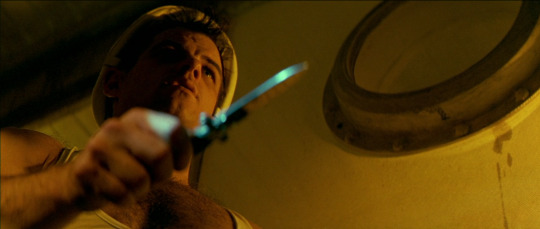
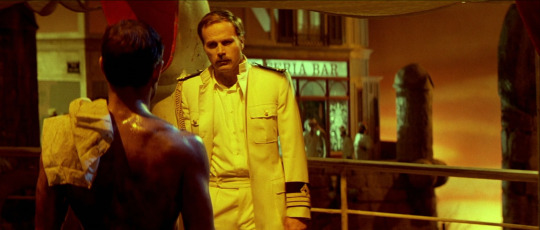
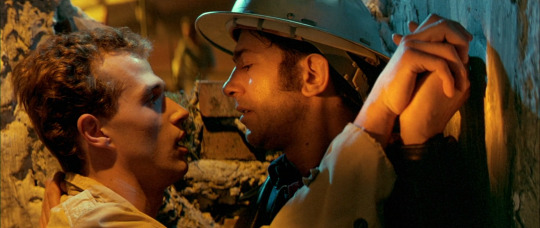
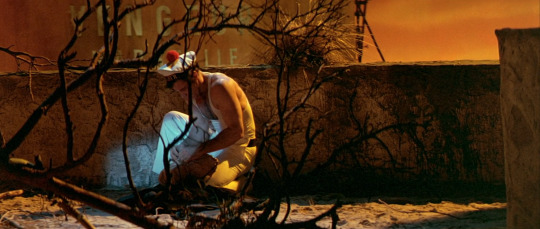
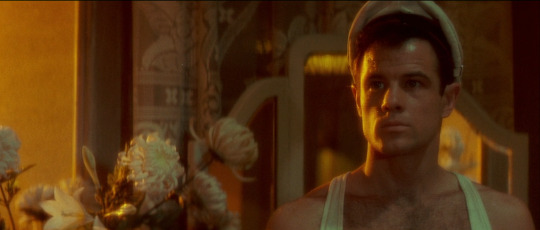



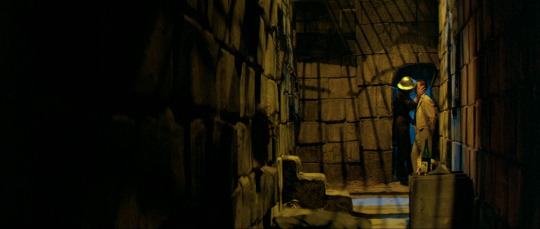
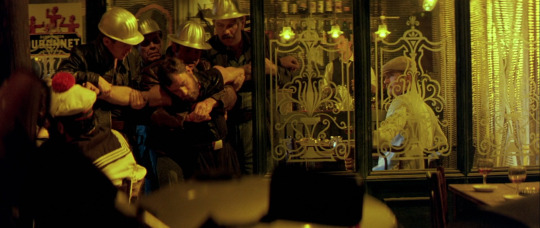



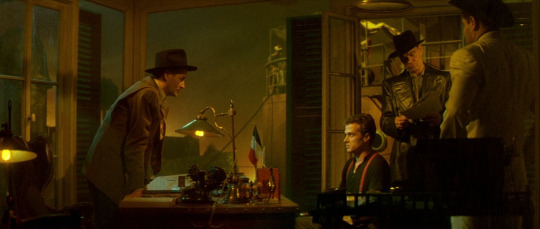
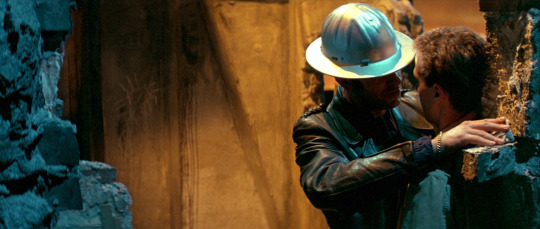
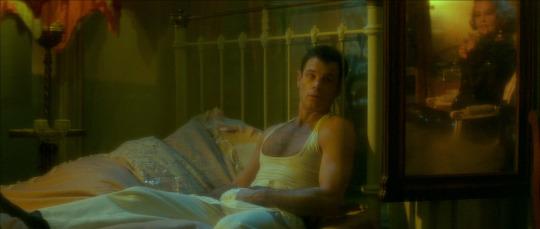


Querelle (1982)
The Gayest Director of All Time adapts the Gayest Book of All Time in this queer art house classic, which relishes in the perverse delights of the absolute gutter.
Director: Rainer Werner Fassbinder
Cinematographer: Xaver Schwarzenberger
Starring Jeanne Moreau, Brad Davis, Franco Nero,
#querelle#rainer werner fassbinder#jean genet#queer film#lgbtq film#lgbtq#classic film#jeanne moreau#brad davis#german cinema#french cinema#cult classic#production design#criterion channel#querelle of brest#80s movies#80s film#arthouse films#gay film#lgbt cinema#bisexual cinema#franco nero#novel adaptation#film adaptation#our lady of the flowers#international cinema
24 notes
·
View notes
Text




The Sedlec Ossuary (Czech: Kostnice v Sedlci; German: Sedletz-Beinhaus) is a Roman Catholic chapel, located beneath the Cemetery Church of All Saints (Czech: Hřbitovní kostel Všech Svatých), part of the former Sedlec Abbey in Sedlec, a suburb of Kutná Hora in the Czech Republic. The ossuary is estimated to contain the skeletons of between 40,000 and 70,000 people, whose bones have, in many cases, been artistically arranged to form decorations and furnishings for the chapel.
Four bell-shaped mounds occupy the corners of the chapel. A chandelier of bones, which contains at least one of every bone in the human body, hangs from the center of the nave with garlands of skulls draping the vault. Other works include piers and monstrances flanking the altar, a coat of arms of the House of Schwarzenberg, and the signature of František Rint, also executed in bone, on the wall near the entrance.
5 notes
·
View notes
Text
MARGARET ANNE MOZART // MUSICIAN
“She was a musician and older sister of Wolfgang Amadeus Mozart and daughter of Leopold and Anna Maria Mozart. There is evidence that she wrote musical compositions and there are letters from Wolfgang praising her work. According to Maynard Solomon “at three, Mozart was inspired to study music by observing his fathers instruction of Marianne, he wanted to be like her”. Even in her later years, she was a highly esteemed piano soloist in concerts at Prince Ernst von Schwarzenberg’s house.”


2 notes
·
View notes
Text
My Favourite Quotes from: Niki Lauda Der Weg Zum Triumph by Peter Lanz
I finished reading the second book I got the other day, so here are the typed-up quotes that I liked. This is translated from German to English via google translate, so it's not grammatically correct and might have some mistranslations.
"If he appears to strangers as a cold, calculating man, he is in fact sensitive to moods and registers feelings that others have towards him very quickly and sensitively"
"Accordingly, Niki Lauda was disappointed in the evening when his wife Marlene came from Ibiza in Nelson Piquet's private jet. He said: "I want to drive the best race of the season tomorrow, but the most important thing in Formula 1 is to survive, that's also part of it."<< Marlene Lauda hadn't traveled to races for five years. She dismissed the fuss of the last few months with a catchy sentence: "It's nice when Niki becomes world champion, but what do I have to do with that?" But now she couldn't stand being alone in her house in Santa Eulalia on the race weekend , although she said she was going mad with excitement in the box, she came to Estoril. At the same time, I know that Niki can also become world champion without me. Reinhold Messner also climbs mountains alone. He doesn't need a woman for that. And Niki Lauda said: "I'm happy when she's there, but that doesn't mean I drive faster or slower."
"Second place meant the world title at that moment. Lauda was asked what he felt in those seconds: "Above all, fear that the petrol would not last until the end. It was trembling and praying. Shortly after five o'clock in the afternoon, when everything was finally over, Niki Lauda showed, perhaps for the first time in public, how much he was carried away by the joy and pride of victory. He, who often doesn't change his face after winning a race, got all excited, hugged his wife again and again, shook everyone's hand and even furtively stroked his eyes once or twice... As the champagne was passed onto the podium, Niki Lauda started shaking the magnum like a little boy and splattered the champagne all over the place, so that in the end Alain Prost, Ayrton Senna, McLaren boss Ron Dennis and the car's designer John Barnard, standing with Lauda on the podium were completely soaked."
"Marlene Lauda even hugged Alain Prost, and Niki Lauda kept saying: "I'm really sorry for Prost. he was for the biggest challenge for me in the 13 years that I've been driving Formula 1. Now that the war of nerves is over, I can tell you - he's a really good guy. The next day, Niki Lauda brought his wife and children back to Ibiza and flew on to his office in Vienna himself."
"We had met in a café on Vienna's Schwarzenberg place agreed. When Lauda came in, he did not correspond at all to the image that is commonly made of a racing driver. He seemed rather shy and uptight. He wore a light-colored duffle coat, corduroy pants, and Clarks. In contrast to later times, he immediately made an extraordinary effort to appear in the best light. Somehow he seemed very proud that journalists from Germany flew to Vienna especially to talk to him. We then drove to his parents' house on Potzleinsdorferstrasse, where he had a room, and the first thing Niki Lauda did was to call the Levis jeans advertising man to tell him that he was giving an interview. Then he called the Bosch recruiter and rattled off the same litany again. I don't know if he was so proud of being interviewed at the time or if it was a service for his sponsors, in any case he was very accommodating and when the photographer asked him to he gathered all his trophies and draped them around himself on the needle felt floor. We then took a picture of him packing his racing suit and one of him lying on the couch reading a book. nod The room in which he lived was about thirty square meters and furnished in a rather carelessly manner. The wall was covered with veneered cupboards, there was a washbasin and a shower behind a partition and there were a few Reansport books on the shelves between the trophies. Once his mother looked briefly at the door but went right back. Niki Lauda wore his hair quite long back then, it was neatly parted and smooth, not as curly as it is today. He had a signet ring with a black stone on his left ring finger. His demeanor made him look like hundreds of other boys from upper Viennese society. Only his language didn't fit the picture: he spoke a strong dialect, and to this day he has maintained a certain fondness for flowery expletives. Of course, he knows how to speak High German on TV or in radio interviews, but in small circles, rude words come out quite easily. At that time, Niki Lauda collected the newspaper clippings and photos that dealt with his racing career. He probably wouldn't like to admit that today, but at first he was exceedingly proud when there was something about him in the newspaper. He often called sportswriters on the go and told them how the races he had competed in had turned out. Out of gratitude, the Viennese newspapers always wrote a few words about the young Austrian Lauda, even if he was only placed somewhere in the middle. Nothing that Niki Lauda learned today about his early days counts, is 100% correct. But it's not a lie either. Rather, it's a mixture of half-true memories and a role cliché that he's grown into over the last ten years. In any case, it is certain that it all began in 1967. With a car accident." -p27-29
"So Niki Lauda told her (his grandma) the story of the borrowed car and the accident. He must have told the story to Berst dramatically, because when he left his grandmother he was 38,000 shillings richer - a little over five thousand marks. He was able to buy the battered Mini 1300 from Jose Draxler. For Niki Lauda, getting into racing was a means to an end. All sorts of people in the years that followed made terrible accusations against his grandmother for helping him become a racing driver. If N Lauda had a really warm relationship with a family member, it was with the old lady. And when, many years later, he decided to finish racing, it was Marlene Lauda, his wife, who first called grandmother and told her about the decision.
Question: What is your first childhood memory?' Answer: "I always had to go horseback riding when I was eight or nine years old. I was terrified of the stupid horses. I always disappeared to the toilet and hoped that I wouldn't have to ride then. I never knew why my parents sent me to horseback riding. They just wanted it. Out of. Then I remember my nanny. That must have been before. I was always raised by nannies. I remember her kind of uniform, she had a cap like that on her head. She was about thirty years old. Normal looking, not particularly pretty. She existed, but she couldn't replace my parents. I also remember something that happened when I was about seven years old. My father parked a car on a mountain with the handbrake on. And somehow the handbrake disengaged. Anyway discovered I did and ran with my brother. And I held. We screamed like crazy, then my father came." - p33-34
Niki Lauda didn't get along very well with his classmates at school. Although his parents him repeatedly dragged him to dentists and oral surgeons to have his teeth adjusted, he had to put up with the ridicule of the others. They called him rabbit or squirrel because of his protruding teeth, and his mother's pampering concern did the rest to make Niki Lauda appear as half a portion to his peers. He had to go to school in a hat and coat at the slightest breeze, and once he said: When I think back today and myself. and see my brother when we were kids, well, we were pretty sweethearts.” Which means something like sissy. According to his brother Florian, who is four years his junior, he was "terrified". Nothing fascinated the sissy like a car. - p34
"Niki Lauda once said to me: >> Many young men only start racing out of a need to show off or because of complexes. If you are successful and recognize your complexes, you can discard them. I had a tremendous number of complexes. inferiority complex. I was always bray, I'd never pulled a rascal prank. The only thing that didn't fit the picture of the model boy was my bad performance at school. I was particularly bad at religion.” - p35
"I asked him, 'Have you been dealt with harshly? Have you ever been beaten?< Laura: No. Barely. A slap in the face at most. I have one brother who is studying medicine. He's younger than me. He's very different from me, he's a very quiet, dreamy, spiritual idealist. His interests go more into the music.<< Question: 'Then you are a loud, unromantic, realistic person?' Lauda: »I am harder and more stubborn.<<" - p36
Back then, nothing fascinated Niki Lauda more than trucks. When he spoke in a Playboy interview in 1974 about how crazy he was about trucks, that he was almost addicted to driving such a thing, the Steyr works made a truck train available to him for a day. Lauda drove the truck to Zeltweg, onto the race track and did lap after lap. He'd never gotten a truck license, but he was a natural. He was having fun like a little kid, chasing the train around the track at breakneck speed and making the back of the truck swerve. He even considered opening a trucking company in the past because he was so fascinated by trucks. - p37
"Niki Lauda packed. He had a stack of suitcases in front of him and a light canvas bag with leather details. In it he put his racing overalls, crash helmet, head protection, fireproof shoes, high gauntlet gloves and coarse underwear, which in an emergency could keep the fire away from the body for a few seconds. » Where are my swimming trunks?' asked Lauda. It was bitterly cold in Vienna back in January 1972 and the cold was gradually eating through the brick walls, like that that people had to heat up their ovens vigorously in order to to get the apartments tolerably warm. Mariella von Reininghaus, Niki Lauda's girlfriend, was rummaging around in a drawer. They were at Lauda's parents' house in Vienna. "Here," Mariella held out the swimming trunks, "there she is." - p43
"act that is second to none. At the time, he would break down the doors of anyone who could help him in any way. His confidence bordered on the insane" - p46
"Once upon a time, in November 1972, a skinny, brunette boy started getting drunk in a Viennese wine bar. This young man, who usually only drank apple juice and milk, drank one glass of wine after the other. He had good reason to. He was broke. He was in debt and had no job. The boy was Niki Lauda. He gambled big and lost. There he was with a horrendous loan and no racing car. Because Max Mosley put him on the street at the end of the 1972 season. A stupid situation for the young man from the best family. He was with a sportswriter at the wine bar to get drunk. "Now I don't know what to advise you either," the journalist was saying. The two were silent for a while. Then they ordered wine again. "I could take a job in an office," said Lauda pensively, "and then slowly pay off my debts. ask them for a contract for touring car races. "You would earn more that way than in the office." "But not enough," said Lauda. He had reached the fourth quarter of white wine. It never occurred to him to ask his father for money, although that would have been the easiest way in the situation. He could have helped him. But Niki Lauda decided that only one person could pull him out of the shit he was in now - Niki Lauda. "Louis Stanley asked for my address at Watkins Glen last month for the American Grand Prix," he said thoughtfully. >>So what?< >>What and?<<< »Did you give it to him?<< Laura shook her head. "Not yet. I don't think Stanley had any honest intention of enlisting me. It was just a joke.' The journalist grabbed his arm and looked at him as if he were looking at a madman refusing a cold beer in the desert after seven thirsty days. "Come on," he said, "come on, you have to use every chance you have now."<< Two days later, an airmail letter from Vienna landed in the attic suite of London's venerable Dorchester Hotel on Hyde Park Corner. express, of course. Sender: Nikolaus Lauda. - p49-51
But before Niki Lauda entered the fashionable Dorchester, he passed the Playboy Club, where the Bunnies were busily running around behind glass facades on the first floor. He stopped for a moment and looked up. The girls looked good enough to eat in their tight suits with bunny tails on their buttocks and long legs. Then Niki Lauda quickly walked the few steps to the hotel. The most expensive English luxury limousines were parked bumper to bumper in front of the driveway. This time, Niki Lauda's heart beat even harder than when he saw the Playboy bunnies in the club. Whenever he sees a nice car, he's completely smitten. An almost sensual desire overcomes him, he wants to touch it, sit in it, look under the hood, drive around with it. That was the case then and it's not much different today. Niki Lauda used to wash his car every free hour. There was something immensely calming about washing the car. - p51
Lauda has a cleanliness tick when it comes to cars. His car must always be sparkling clean, Helmut Marko once gave him a car vacuum cleaner, one of the nicest presents, as he claimed for a long time. P52
"A few days earlier he had borrowed a tuxedo for a party. Lauda, who hated formal attire, was quite glad he had his tuxedo with him. He was blessed. After the aperitif, Louis Stanley said: 'Wonderful what you did today. Very splendid. honest.< Fittipaldi and Stewart, the two world champions, came to congratulate them. The Austrian racing driver Lauda was even a little tipsy. After dinner, Stanley offered Lauda a cigar. Lauda refused. Back then, he only smoked a cigarette once, but only when his sponsor, Marlboro, could see him." - p60
He, who doesn't like discotheques, was persuaded by the nightclub manager Bruno Reichmann to advertise a discotheque called Half Moon in Salzburg. He received five thousand schillings a month and the rumor spread that the bar belonged to Niki Lauda." - p61
Lauda later said: "It never occurred to me that there could be another person in the car. The car had overturned, one ran around with a fire extinguisher and tried to extinguish his car. That's what I thought.<< Only when Lauda's BRM fails on the 52nd lap due to fuel pressure problems does the Viennese slowly realize what a drama he had unknowingly witnessed. He didn't help because he didn't know anything about it and because the mushroom cloud made it impossible for him to see what was happening. Lauda felt dying. He crouched in a corner of the box and didn't want to see anyone. A reporter came by. >Why didn't you stop, man? Wh did you let the poor fellow burn without any help?' Lauda was depressed. “I got a puff of smoke. I didn't know there was another one inside. »God in heaven, why don't you see that?<< >If I come along with 250 things, the route i wet from the foam of the fire extinguishers and the air is fuller Rauch, then I must see that I put my BRM on the stop.<< >But I still don't understand why you don't could see.' Lauda became angry. Hell, he had the poor one Roger Williamson actually not seen. He had chosen a goddamn profession, he felt that at the moment and he was full of self-doubt and blame. But the journalist did not want to hear all this. He wanted to hear something else. So Niki Lauda told him: "I'm not paid to save, but to drive." - p63-4
"I asked Lauda: »An American psychologist found that 600 racing drivers who were examined had an above-average desire for intimate intercourse and a great need to attract attention in women. How do you feel? Lauda replied: "Maybe that's how it is in America. It's different here.<< I quoted Stirling Moss, a former racing driver >>There's always a bunch of girls hanging around the racetrack... the sights and sounds that accompany the drama of a race are a strong attraction for almost all women. During a race a woman is more receptive to an offer than usual.<< Lauda said: >> How does Moss want to be able to judge that if he is not a woman? The women who hang around there go to the races because they want to meet one of those special people. So the receptive women go there.<<" - p70
"In the evening, Niki Lauda went to a discotheque in Madrid with Mariella von Reininghaus. Suddenly the Blue Danube Waltz sounded. Lauda said to his girlfriend: 'Today I felt like someone who always stands at the station and has to watch his train go by. He finally stopped today." - (after his first win) p80
"It snowed. Thick, sticky flakes steadily sank to the ground. Lauda liked skiing. He skied for as long as he could remember and he skied very well. Actually, apart from car racing, skiing was the only thing that actually fascinated him at the time. He watched ski racers on TV and really suffered with them. (Much later he was to develop a close friendship with ski racers. When Franz Klammer finally managed to win the World Cup again in 1981, after many, many defeats, Niki Lauda sat at home in front of the television and cried with joy.) In the winter of 1969 he went on holiday in Ba Gastein. It was very cold then. It seemed as if one's breath froze in front of one's lips. Niki Lauda stood on the slope, jumped, pushed himself, took his sticks under his arms and sped off... suddenly he gave a jolt, he lost his footing, snow flew up, he fell, rolled in an avalanche straight down the slope. When he finally lay still, everything was spinning around him. He rubbed his eyes. A young girl stood next to him and watched him silently. The girl was five foot five at most, fairly thin, and had a delicate bone structure. It had huge amber eyes. Niki Lauda later remembered the girl's first words to the letter: "Can I help you in any way?" That's how he met Mariella von Reininghaus." - p82-3
"Niki Lauda hates being photographed. He doesn't like to pose and when a photographer persuades him to do so, he usually looks at the camera in an angry or artificial manner. He didn't like it either when someone wanted to photograph him in his first apartment of his own. However, since his popularity also increased the demand for personality stories, he had to endure a few private photos for better or for worse." - p84
"Before Mariella von Reininghaus, Niki Lauda only had one close friend" - p86
"Once, in March 1982, he was the guest of honor at the Astro Show. He told me at the time that he didn't believe in astrology, that he only went to the show because he liked the presenter, Elizabeth Teissier, so much. He then actually sat across from Madame Teissier throughout the broadcast, gazing at her as enraptured as a rabbit would gaze at a snake, and yet denying all the things that Teissier claimed to have gleaned from the stars about him. But... somehow everything fascinated him." - p87
"Niki Lauda thought he was going crazy for a moment. The spectators behaved like wild animals. Thousands upon thousands pressed on him from all sides. Someone suddenly gave the order for the new champion to be pulled out of the confusion with mounted police officers. Suddenly,« Niki Lauda later recalled, I was surrounded by ten police officers. The policemen sat on mighty horses. I just saw the buttocks and the dangerous hooves of the horses. And so we walked around. It was almost horrible, and I would have wet my pants for fear." - p97
"It was around this time that Niki Lauda started chasing after the girls like crazy. He got engaged when he was almost 20 years old and before that had hardly had time to gain experience with women. A reporter once asked him, "Can you remember the names of your girlfriends? And Lauda answered to everyone's amazement: "Yes, because there was Mariella and before Mariella there was Ursula Aus - that was it." His dogged determination to raise money and get the cars he was given roadworthy took all his strength. In addition, of was shy and more comfortable in the company of other racers." - p98
When he gained enormous popularity after his first Grand Prix victories, he clearly noticed for the first time how unimportant external appearances are for a man. The women fought for the successful one. And to his surprise, he found that he could win at the girls even against handsome men like Clay Regazzoni, the womanizer with whom he often hung out at the time. And he slowly began to get a taste for social life. He really enjoyed being the star of Munich society. And the glittering, glamorous society found it fabulous when the young star Niki Lauda suddenly turned up in one of the Ine discotheques such as Why not or Josephines in the evening, in crumpled tweed jackets, with an open shirt collar and a rat's tail of young, glamorous skinny, long-haired girl in tow. Suddenly Niki Lauda was in all the gossip columns. - p99
"Niki Lauda was certainly never a compulsive womanizer who tried to compensate for defeats with conquests, but through his successes he suddenly found a taste for life. that had been foreign to him until then. He no longer had to face the embarrassment of being rejected by a woman he spoke to. He was famous and anyway the girls made a move on him. He once said to me: "'If I think about it, I didn't meet the prettiest girls at the race tracks, but often in discos like Why not.'" - p100
"Once she gave a party in honor of Niki Lauda. It was a warm summer night, the guests had to appear in costumes from the 1920s, but Lauda herself didn't think of dressing up and came in the usual tweed jacket. And in the free space in front of Why not there was a vintage car. Of course there were also photographers and they persuaded Niki Lauda to pose for photos. »Come on Niki, get in the car, we need some pretty pictures. Lauda took a seat, disgruntled. He hated posed photos. When he wanted to get out, the photographers asked him to put his arm around a girl. The girl was a certain Iris Grass, a model who had already been associated with all sorts of high-profile men and who once said of her first encounter with Niki Lauda: »We were both in a bad mood and hissed at each other.<< But over time, the mood changed. Niki Lauda: I liked her green eyes. She always looked so sincere. As if she had no idea of anything. So... I don't know... poor actually, pitiful. But pretty. I got myself the same evening arranged to meet her and often went out with her.<«< Whereupon the Bild newspaper reported: »The small, almost frail Austrian racing driver has a fiancée in his hometown of Salzburg, who is also from Adel. is very wealthy and beautiful. But that doesn't stop Niki from calling the beautiful Munich girl Iris from all corners of the world to arrange a meeting. Then the two go to La Cave or Victor's Bistro on Hohenzollernstraße to feast - and then they end up dutifully at Why not. I like him very much, Iris openly admits and is happy when the Formula 1 racing driver flies quickly from Frankfurt, Monza or Copenhagen to Munich for her sake. However, she doesn't quite believe that Niki Lauda only goes out with her, as he does with a deep look into her pretty. green eyes has claimed.<" - p101-2
"He fell head over heels in love with the actress Christine Schuberth, who had made her career naked in the cinema as the 'Mutzenbacherin', and then with another actress, Iris Berben." - p103
"Once, when the relationship between the two was about to break up, Mariella von Reininghau complained »Niki can only develop feelings about his car and about nothing else. Maybe he needs someone who only sees him as the world champion when he wakes up in the morning. Niki Lauda wrote about the nasty arguments: "We were arguing more and more often, and I cheated more and more often in the summer of '75 - I just needed a lot of variety as a counterpoint." On the other hand: "I had been with Mariella for seven years and was actually pretty sure that we would get married someday." - p104
"Whenever a reporter asked him the inevitable question, Mr. Lauda, how do you feel about sex before the race?' What really drains your condition is what's around it. You get to know a woman at a race track, you go out to eat with her, then to a bar, and you don't go to bed until four in the morning. It's different with your wife or girlfriend. You can still sleep twelve hours despite all the sex. I once asked Niki Lauda: »Jackie Stewart was a monk two days before the star when he was a racing driver. He has a very attractive wife, but he wants to go hungry and hot, what do St think? Lauda replied: "I don't know what Jackie Stewart used for his races. I need my arms and legs, nothing else. I don't think sex and racing cars have anything to do with each other. A woman is a woman, a car is a car. I can try to master a machine, but you have to understand a person.<< - p104-5
"James Hunt, the Brit who snatched the world title from Niki Lauda in 1976, is a man that women love. And who loves women. One of his friends once said: »He starts caressing your body, kisses you all over. Really everywhere. And he doesn't care if a race is coming up or not. For a while he had a sticker over his heart: 'Sex is also a Sport.' James Hunt once fell into the hands of Wendy Leigh, an attractive Englishwoman who was writing for the book What Does a Girl Do? wife researched well in bed. Hunt's wife Suzy had just gotten engaged to Richard Burton and the racer was willing to provide information to the reporter. He said, "Sometimes I analyze myself a little and watch myself trying to maneuver a girl into bed. Then I'm always surprised at how devious I do it. I fool people. It's actually fun for me, just like selling something to people. Sometimes you get a woman who refuses to do certain things in bed; perhaps because she has inhibitions or is afraid that she will like it too much afterwards. It's your job to relax her, work on her gently, explain things to her skillfully, and get her to think it's a good idea. Then there are women who pretend to reject something, they play you their number, refuse to go to bed with you just because they want to appear different from who they are. These women are a waste of time. Others resist certain things in bed and want to make an impression. But they make no impression on me. I like a woman who asks for what she wants in bed, and I tell her that too. The real pleasure in bed, what really gets me excited, is when I can please a woman. I like it when the girls come to my bed and have a great time there. if they really enjoy it, that's great for a man and that can be fun. Personally, I like the women who reach orgasm quickly. Because that means she enjoys it, orgasm is the same as feeling pleasure.<< James Hunt - p105-6
Lauda didn't like the superficial party talks. He'd never gotten used to the chatter, and for a brief moment wondered if there wasn't a way to slip away undetected, when suddenly he felt someone watching him. He looked up. A beautiful young woman was quiet to him kicked, sat down and naturally put her hand on his knee. The hand was long, slender, and soft as a feather. >Are you thirsty? Do you want something to drink? whisky, gin, Cognac?< She addressed him as "du" straight away, and she had a voice, heaven, what a fascinating voice. A little hoarse, with a barely noticeable foreign accent. It was only much later that Niki Lauda found out that she was born in South America and that she had been brought up there for a few years. In all honesty, he replied, 'I'd have an appetite for a mineral water.< Oh. She gave him an amused look, got up without a word and brought him a glass of mineral water. - p111
"Marlene Knaus was extraordinarily pretty. She liked to wear her hair up, had a dazzling figure and worked as a model in Munich for a while. From time to time she was also photographed naked. (The photos of Marlene, with her hair pinned up, naked, crouching in a wicker chair, still haunt the editorial offices of daily newspapers to the displeasure of her future husband." - p113
Lemmy Hofer came a short time later. Lauda stood up and took a deep breath, the beautiful Lemmy Hofer from yesterday's party. Marlene Knaus. Curd Jürgens' girlfriend! With a few quick steps he stood in front of her and took her hand. "What are you doing there?" he asked awkwardly. Marlene grinned and Lemmy intervened. 'I spoke to her on the phone this morning. She was bored and we made a date. So I thought, just take her with you.' They sat down next to Niki Lauda. Marlene was silent for a while, then she said cheekily: "I wanted to take a look at Niki Lauda in daylight. That's what she did until Lemmy Hofer said: "Imagine, Niki, that Marlene has her no idea about car racing. She thought you were a Marlene nodded. »Yeah? They all ordered coffee. Lauda looked at Marlene furtively. She had a wonderfully even face. the Hair was back in a bun, her skin suntanned. Her hoarse voice, her closeness... I had seen many beautiful women. They didn't worry me. But this woman was something very special.< How would other men behave in Niki Lauda's situation? They would have used all their charm to impress Marlene Knaus. Lauda not. He turned to his friend Lemmy. »Tell me, what's new in Vienna?<< Lemmy looked at him in amazement for a moment. Then he began to tell. The two of them chatted about old times all afternoon. Marlene listened. She said nothing, no doubt irritated that none of the men took any further notice of her. When she said goodbye, she asked Lauda: "One thing I would like to know... are you always so... so reserved?" Niki Lauda smiled. »Depends.<< He had the feeling that he had won this first round." - p117-8
"Miss Knaus, please." »Miss Knaus isn't here.<< Niki Lauda hesitated for a moment. "When will she come back?" We're not expecting her any time soon.'< 'Where is she?' Miss Knaus is in the hospital. She has severe pneumonia.<< Niki Lauda asked the name of the clinic where Marlene was. Later he told friends with a grin: 'It wasn't nice that Marlene was in the hospital, but it was my big chance. Curd Jürgens was shooting a film in Vienna, but I was there. And I sat at his girlfriend's bedside as often as possible.« He visited Marlene every day. And when the doctor threw him out after a while, he would stand by the window and talk to her. She says, "I thought it was cute. I was in a bad way, but Niki helped me with his visits.<<" - p119
"Where do you want to go, Marlene?<< I would love to take you to an inn and have a schnapps.' Lauda had to laugh. "I'll bring the car here carefully so that the doctors don't notice anything," he said. "You're getting dressed and then we'll take off.' No sooner said than done. Fifteen minutes later they were already behind them in Salzburg. Niki Lauda stopped in a pine forest. "Shall we go for a walk?" "Gladly." Marlene got out. He took her hand. Tall conifers left and right. A narrow path, covered with pine needles. Cicadas chirped. The inn, which they soon reached, looked rather run down Window frames hung askew in the wall. Lauda put his arm around Marlene. They entered. Farmers from the area sat at massive oak tables with smoothly scrubbed tops. The only thing not in the tavern fitted, the jukebox was in the corner. Nobody here knew a racing driver, Niki Lauda, and nobody cared about Curd Jürgens' girlfriend. They sat down at an empty table. Marlene laid her head on his shoulder. The innkeeper joined them. Niki Lauda ordered slivovitz twice. You could see a piece of sky from the window. Clouds came up. A locomotive whistled in the distance. A hit came from the jukebox. The innkeeper brought the schnapps. They drunk. Niki Lauda took Marlene's head in his hands and kissed her she. Shall we have another one, Niki?< »But then we're really drunk.<<< So what? The whole afternoon is ours. They held hands, and Niki Lauda suddenly realized: this is the woman for life! Suddenly he felt as if someone had turned on the light in a dark room. He himself had always resisted marriage, he had said: 'If two people like each other and live together, there is no need for a marriage certificate.' But in a tiny second everything had changed. Niki Lauda felt he had to seal his relationship with Marlene Knaus. She asked him, "What are you thinking about now?" And he answered: 'I remember that I'm always with you want to stay with you Always.” His racing car, the world championship, Mariella, Curd Jürgens… everything was suddenly far, far away. The small village economy became the center of the world for him. He was happy. - p121-2
"There is no doubt that Lauda suffered greatly from public attention in his first year of the World Cup. He had enjoyed being a celebrity in the beginning, but it was already too much for him." - p123
"Another racer, who has since died in an accident, took a particularly good-looking stewardess to his bungalow and began exchanging affections with her in broad daylight. Of course, Lauda and Stuck and a few other racing drivers noticed. They crept up to the bungalow, quietly opened the window and then splashed cold water in the room and on the two naked people." - p128
"Once some one poured milk in Jacky Ickx bed. The sun burns relentlessly hot on the bungalows during the day and when Ickx wanted to go to sleep in the evening, there was a pitiful smell of sour milk. Ickx returned the favor and smeared the windows of Lauda's rental car with honey. Mario Andretti, the American Indianapolis winner, piled up all the sun loungers in the swimming pool one night, a little nervous, and James Hunt was delighted to go naked through the pool scurrying around the garden and scaring the female guests (until all of a sudden he got fed up with the fuss and moved to Sleepy Hollow a few miles away and ended up trying to stay with friends when he didn't like it there either)" - p128-9
"Three years after her first visit to Kyalami, when Marlene Lauda was pregnant and couldn't go with her, she sent her husband a sex doll by post and wrote »so that you don't get any stupid ideas down there«. It was also a birthday present for Lauda. Oddly enough, the puritanical customs of South Africa, who otherwise rigorously confiscate every sex magazine, had nothing against the inflatable doll and Niki Lauda's friends seized it, dressed it in overalls and laid it in the garden." - p129
"Niki Lauda, who was with Mariella a few months earlier von Reininghaus had said, "Hand on heart, I feel married and a ring and a marriage certificate wouldn't change that much either," suddenly moved heaven and earth to get the marriage papers for Marlene and himself. "I wanted to marry her because I wanted to get married," he told me at the time. »It's a feeling - she belongs to you. There's no logical explanation for that.<< If someone spoke to him about Marlene's pregnancy, he got very angry: "When a racing driver is married and has children, he doesn't drive any differently than usual. It's just me driving, not mine wife, not my children. When I race, I turn off everything around me. I don't think about whether my wife is pregnant. It doesn't matter if I have 36 children and five wives, or none at all. Anything else is idiotic. A few days after the race in South Africa, Niki Lauda married Marlene Knaus. So that no one would get wind of the event, they decided to get married in England. But then things didn't work out with the papers, Marlene Knaus doesn't have a birth certificate because it was burned at some point in Venezuela and Niki Lauda couldn't find her parents' marriage certificate. Salzburg was just as out of the question as a place for the wedding, just like Vienna. "People would have been standing in line," said Niki Lauda to his friend Dr. Oertel, who got him the first sponsorship money from the Raiffeisenbank years ago. So Niki Lauda and Marlene Knaus decided to get married in Wiener Neustadt, a good hundred kilometers from Vienna in Lower Austria. No one took care of Lauda there, Dr. Karl-Heinz Oertel was the best man and had to lend Niki Lauda a tie because the groom didn't have one." - p131-2
"A child seemed to complement Niki Lauda's life. It gave him the chance to correct his own messed up childhood. Marlene would make the child feel. to be needed and useful. She surrounded herself with a lot of care, and Niki Lauda didn't tell her that during a first training session on the Jarama race track in Spain had crashed through three fangrines at more than 200 kilometers per hour and had been hit in the skull by a wooden stake. Although he had a headache, he continued testing despite the slight concussion." - p132-3
"She remembered for a moment the first race she had witnessed in South Africa. She had been at the finish tower and when he won she ran down to congratulate him. Hundreds of people pounced on Niki Lauda, everyone wanted something from him, Marlene involuntarily withdrew and just waved at Niki Lauda. On the plane she congratulated him and ordered champagne. He adjusted his seat so that he could sleep comfortably. Before he fell asleep, he asked her, "How did you like the first race you witnessed?" And Marlene answered: >>You're all a bit crazy, I think." - p148
"Around this time Marlene Lauda drove to Salzburg, from the airport she wanted to fly to Cologne with the pilot in Lauda's plane and meet her husband. She was a little confused. In Vienna she had had a very strange dream that would not let her go. It had been Friday night into Saturday night. »I saw, she told Niki Lauda's mother, a car on fire. It was Niki's Ferrari. I saw that very clearly. But only the car was on fire, I didn't see Niki.« Lauda's mother tried to calm Marlene, when that didn't help, she snapped at her. >stop. Don't talk nonsense. Here, take a pill.< Marlene thought about this dream while driving to Salzburg Airport. Of this dream and the race from the Nürburgring... it was 1 p.m." - p154
"Arturo Merzario, the small, skinny Italian, was the first to help Lauda. He was lying behind Lauda in his Wolf Formula 1, stopped immediately, jumped out and ran into the flames. Afterwards, he kept remembering what he witnessed at around two-thirty in the afternoon on August 1st: 'Lauda's screams were terrible. I didn't understand what he was shouting, but I can imagine it.<<" - p156
"When the announcement came through the loudspeakers that Niki Lauda had had a serious accident and that the race would be started again, a few thousand spectators in the finish area started to laugh and shouted and hooted with joy. Huschke von Hanstein gave a first radio interview: "Niki is fine," he said, ser is already flirting with the nurses.<< Then the race started again, but four cars were missing: those of Brett Lunger, Harald Ertl, Chris Amon and Niki Lauda." - p159
"When the ambulance brought Lauda to the hospital on the edge of the rolling hills of the Eifel in Adenau, there was tremendous excitement. A doctor held out a telephone receiver to Lauda: "A call for you, Mr. Laudas," he said. Brazilian radio. They want to do an interview with you.<< It was completely absurd. Lauda lay on the stretcher, got a telephone receiver in his hand and spoke live with a reporter. The conversation was broadcast on the radio across Brazil. But Lauda still doesn't know what he said back then. He was completely gone and has no memory" - p161
"The two nurses who took turns tending to him had soft, friendly voices. Later, when he could see again, he noticed that they were very pretty." - p168
"Once his wife asked him if he would like his parents to visit him. They were in Mannheim, but they didn't want to let them into the intensive care unit without his knowledge. Not yet, Lauda indicated with his wife's hand movements. They communicated by finger pressure or by raising and lowering their hands. Lauda couldn't talk. Marlene Lauda remembered: »I stayed in the hospital, I couldn't go to the hotel. I didn't want to take Valium either. Everyone always gave me Valium. I didn't take any. I collected the pills because, I thought to myself, if anything happens, you'll take them all at once. I already had a whole bunch.<<" - p172
"He really wanted to see himself in the mirror. The doctors forbade it, but when nobody was looking he would sit up and face the glass windows in such a way that he could at least catch a glimpse of his appearance. On Friday the swelling around his eyes receded, he recognized his wife and mother. Whoever wanted to visit him had to strip down to his underwear and put on a sterile gown. He blinked at his mother and croaked, "My God, how do you look?" The green smocks confused him. "You look like Martians," he said." - p173
"One night he got up quietly and crept into the bathroom. He looked in the mirror for a while and said to Marlene, who went to the hospital at five o'clock the next morning. »Now I look like I did at the carnival in Rio. Or one of the leading actors in a horror film.' Marlene Lauda didn't know whether to laugh or comfort him." - p174-4
"They came up with all sorts of tricks to let the transport go smoothly. They issued a bulletin saying that three days later the patient Nikolaus Lauda could be transported from Mannheim to Ludwigshafen by ambulance. In truth, however, they drove to the other clinic the following day in the private car of Prof. Peter, the head of the hospital at the time. It was like a thriller and Niki Lauda had fun doing it. He was given a wide-brimmed hat and a blanket covered his bloated body. And while the reporters were standing in front of the front door, they carried Lauda through the delivery entrance to the doctor's Mercedes." - p174
"Lauda had to record radio commercials for a while, which were broadcast before the races and sounded like this: Narrator: Niki Lauda, who do you fear most when racing in South Africa, Hunt, Scheckter or Fimpaldi? Lauda: None of the three. Only the customs, because they always want to take my Römerquelle away from me, because they think it's a magic potion He was paid 180,000 marks for saying such nonsense." - p191
"He always knew that he could hit some people, yes, that he could hurt some if he stole a disproportionate amount of money from them. He punished people by charging astronomical sums. I remember once having lunch with Niki Lauda in a particularly expensive Munich restaurant. He had brought his wife and two other friends. And then there was an older man who wanted to win Lauda for some business. I noticed that Lauda felt uncomfortable in the man's company. He didn't like him. When it came to paying the very high food bill, Lauda shirked. He also motioned to the rest of us to leave the bill behind. In the end, the businessman had no choice left to pay. And Niki Lauda triumphed" - p200
"Lauda herself characterizes himself differently. He once told me: »I really enjoy a candlelight meal with tender music by Leonard Cohen or Gorden Lightfoot, I love sitting in the middle of a green meadow and looking at the flowers.<<" - 211
"On the other hand, he is brutally open in some respects. When his four-year-old son Lukas once asked him where the severe facial burns came from, he put the child in front of the television and showed the video cassette with the film of the accident. 'You see,' he said, 'I sat inside and burned myself.' Lukas was terribly frightened.
He doesn't mind if children stop and look at him and ask what happened to his face. But he hates being stared at by adults. He once said: “I don't like intrigues and lies, even if I'm not involved myself.” What he fears most is “people's stupidity. Not if they're uneducated, but if they're just stubbornly stupid." - p211
"While the phone rang in the living room, Marlene Lauda sat her son Lucas in his little chair. Niki Lauda had said goodbye to her two days earlier and she had no idea that he was planning to give up racing. She kissed him the usual farewell, then he sat down in his car in the garage, about twenty yards away to the kennel, she walked alongside. She picked up the phone. "Yes, please?" "It's me, Niki." It was silent for a moment. Marlene asked: "Why aren't you at training?" She was a little irritated because her husband called at a very unusual time. Lauda replied: "Look out, you can tell Frau Meier, our housekeeper, that she no longer needs to wash my overalls." At first, Marlene Lauda didn't understand what her husband meant. Then she asked softly and doubtfully: Have you... I mean... have you stopped? 'Yes,' he replied. 'But' she didn't know for a split second what was happening to her... she wanted to scream with joy... but she just said: 'You can't stop suddenly, in the middle of the season... why. "Nothing. I have stopped. I can stop.< Bernie Ecclestone picked up the receiver and said: >Marlene, Niki has gone mad.<< Finally, Niki Lauda calmly said goodbye to his wife. Marlene Lauda later confided to friends: »I thought motionless for a whole hour. Why now? But then I stopped wondering. Because, let's assume it's the kid or something. I think he should keep that to himself.<< Marlene went completely nuts. She phoned her sister in Geneva and immediately yelled: »Niki stopped.<< She said later: »I called my doctor. I had him paged by radio at the clinic. This is the doctor who gave birth to Lucas - he's so nice. I called down at the village inn in the middle of the night and said everyone who is there now can drink whatever they want and as much as they want on my account. I also recently called Curd Jürgens. I was already a little tipsy. He was really happy. Anyone who doesn't know something like that doesn't know what it's like to suddenly no longer have to be afraid for the man. No longer afraid that one day they will carry him away on a stretcher and you stand by and know: So that's it - your life, your marriage.<< p219-20
"In early 1977 he even flew from Austria to California in the Cessna Citation, a jet-powered aircraft. The flight lasted 23 hours. Marlene Lauda played stewardess, served ham sandwiches, pepper sausage, mineral water and hot coffee. When they arrived at the Hotel Holliday Inn in Long Beach, everyone thought that Lauda had gone crazy." - p229
"He called a press conference, invited the journalists onto his plane and flew around Austria with them. He was particularly lovable and, for the first time, did something he had always detested. He also took Marlene and his son Lukas, who was born in April 1979, with him and offered the photographers and journalists the opportunity to take family pictures. When Lukas was born in 1979, Niki Lauda was in Long Beach because the American West Coast Grand Prix was coming up. He heard about the birth of his first son over the phone before flying to Las Vegas with his then-team boss Bernie Ecclestone to see the new racetrack. And it was clear to him that his son should not be marketed. “I've strictly forbidden photography. A reporter who offered to radio him a picture of the newborn to America was dismissed: "I said no photo, and I'll see my son often enough." Of course he was proud to be the father of a boy, but he didn't want children as vehemently as Marlene did. Once he said when his wife still was pregnant: "If it's a boy, he's to be called Lukas Ben. If it's a girl, we've already chosen a name... wait a minute, that was... oh. damn, i forgot. Well, it doesn't matter.<< In December 1980, when Lukas was one and a half years old, he kept having his picture taken with Marlene and Lukas and also said: »My boy is a super child. He's friendly and incredibly open-minded. He drives like a wild tractor. Only in the passenger seat, of course. But if he's not allowed to come along, he'll start crying.<< - p249-50
"I am too sensitive. And maybe too open. At least for my self. There are situations when people hurt me. And that hurts me. That's why I build a wall around me." - p251
"Now he was vulnerable, a man with little cultural sense whose favorite film is Jeremiah Johnson starring Robert Redford, who went to the opera only once in his life, as a child, and almost fell asleep doing it, who doesn't read novels and only thought of business." - p251
"Once, it was a Saturday morning, he came home to Hof near Salzburg. He'd gone out to buy newspapers that morning and forgot to close the garage door. Marlene wasn't at home either, so the house was empty for a good hour. As he stepped into the hallway, he saw a man walking around in it. He had his arms spread wide and was striding toward the spiral staircase that leads from the garage hallway to the living room. room on the first floor. The man moved very stiffly and earnestly. It looked funny looking As if he were a bird ready to fly away at any moment. He didn't pay any attention to Niki Lauda. Lauda said: "Hello, can I help you?" The other man looked at him and replied: "Ah, Mr. Lauda, nice day. Thanks, it's all right... Niki Lauda thought hard, but he had it man actually never seen before. The stranger now began to climb the stairs with outstretched arms. He touched the railing with his fingertips. 'Damn,' he said crossly. Now it was too colorful for Lauda. "Listen," he snapped, "this is my house. What are you doing?< The other stopped, put his arms down and left towards Lauda. He seemed really upset. "But you're being rude, Herr Lauda," he said. 'I'm building a house like yours and I'd like a nice spiral staircase like that too. I saw yours in a newspaper. Now I have to measure whether my closet goes up the stairs. My closet is<< - he spread his arms apart again - »>about that deep.<< Lauda threw him out." - p252-3
"Lauda let in on the edge of his large property Put up a sign that read: »Private property<<. That didn't help. People came anyway. Even after he stopped racing, they kept harassing him. When someone was at the door again at the weekend, Lauda asked: "Why are you following me?" He said: »I would like to look at your house.<< Lauda answered: »What would you say if I came to you one day and sat in front of your apartment door?«< "This is something else. You are Lauda. «< Marlene was getting scared. And Niki Lauda tried to get a gun. Initially, however, he was denied a firearms license, saying that taxi drivers had caused enough mischief with pistols and that no new firearms licenses were being issued in Austria. Lauda said: "But I'm not a taxi driver. It took a while and several interventions before Niki Lauda was able to obtain a pistol, a Walther, and received the gun license number 074894. This bureaucracy also annoyed him. And slowly the desire to leave Austria, at least for a while, germinated in him." - p254
"Niki Lauda generally says that he is a particularly cautious driver (»Everyone claims that they are good drivers. Anyone who cannot do it at least says they drive >quickly<<<), but in truth he accelerates vigorously, wherever it is possible. I had an appointment with him on April 27, 1981 to find out more about the rumors that Niki Lauda wanted to return to Formula 1. He told me that he had just overlooked a speed limit on a German autobahn and had run into a speed camera at over 200 kilometers per hour. The police officers who then stopped him were quite perplexed. They said it was one of the few devices that could measure over 200 kilometers per hour and that he was the very first to drive in there. Then they said they would consider that a test measurement and he should continue driving now. Niki Lauda was in good spirits, he had been lucky and he could just as easily have gotten rid of his driver's license" - p261
"At first, Marlene Lauda did not want to accept the fact that her husband was getting back into the Grand Prix circus. "She cried quite a bit," Lauda put it gently. "For what Niki is up to there," Marlene Lauda said to me on the phone in November 1981, "there's really only one word - crazy! I have the impression that he must have gone completely mad. When I first read about these rumors in the newspaper, I still thought they were inventions by journalists.<< But slowly she began to suspect that there was more to it than that. >>Whenever Niki talked to me about car racing, she teased his voice a little. Good heavens, I thought if there is nothing in the bush!<< Then one day she received certainty. “Niki came home from Egypt. He had had difficult negotiations about his airline and the Fokker charter and I thought he would be tired and taciturn. But he was all high-spirited and funny. He was suspiciously in a good mood. There's more to come, I thought. And indeed. That evening he taught me that he wanted to try again.<< Marlene Lauda now knew that nobody could be strong enough to dissuade Niki Lauda from making such a decision. »Not if he's really determined to do it.<<" - p266
Niki Lauda attracted the most beautiful girls. A number of top-class love affairs were immediately attributed to him. There he hung out in New York's Xenon and in Rome's Bella Blue he hung out with Ileonora Vallone, the beautiful, long-haired daughter of actor Ralf Vallone. The Munich evening newspaper then asked Marlene Lauda if she was jealous and she replied: "I don't take something like that seriously. After all, I've known Niki long enough.« The picture said: »An infidelity can happen spontaneously with him«, says his wife, »but he would never let himself be caught.« And: »Niki Lauda prefers to come five minutes too early than a minute too late. But every two months he gets drunk with friends in the village inn in the Salzkammergut, but in between he calls his wife. I'll be there soon and won't be home until after midnight. He even missed Christmas Eve. He drank with his pilots, didn't get home until ten and fell asleep next to the Christmas tree. >The next morning I looked in the mirror and said to myself: you asshole." - p272-3
"At the end of 1982, the Laudas decided to move to Ibiza for a while. "Marlene and the children are there most of the time anyway," he said. He liquidated his household in Salzburg and had his two mastiffs put to sleep. Marlene had longed for the dogs after the wedding, they were two particularly beautiful, dark dogs, Bagheera and Balu. The dogs slept in a four-poster bed with checkered curtains and were kind-hearted. "But then suddenly," Niki Lauda told the Bild newspaper, "they became jealous of our children." Because the dogs were running around freely, there was always trouble with hikers and hunters. Once Lauda even left Austrian television is looking for his dogs because they like had disappeared from the face of the earth and he was afraid they could be killed by hunters." - p273
Tagging @f1yogurt to read in their own time; lots of information here
11 notes
·
View notes
Note
Mentioning in your post, wondering if you know more about Amélie d'Arenberg beyond just what's on her Wikipedia entry?
Sadly I don't, Amélie is a rather elusive person and I almost never come across information about her. Usually in her granddaughter's biographies she's only ever referenced to show Elisabeth's "low" ancestry:
Since Vienna knew so little about the future Empress, gossip flourished. The first thing that always happened with newcomers to the Viennese court was critical scrutiny of the Almanach de Gotha. And here the imperial bride was not proof against criticism, for her ancestral line included a Princess Arenberg (the mother of her father, Duke Max). Though the Arenbergs were a family of the high aristocracy, they were not royal — not, that is, a family fit to furnish marriage partners to the House of Habsburg. Grandmother Arenberg, in her turn, was related to all sorts of other aristocratic but not royal families: the Schwarzenbergs, the Windisch-Graetzes, the Lobkovics, Schonburgs, Neippergs, Esterhazys. The future Empress, therefore, was not above aristocratic society but merely a part of it — through complex family relations with nonroyal houses. Elisabeth, then, could not meet the one essential condition to unchallenged acceptability at the Viennese court — a flawless pedigree. She would be made to feel this lack only too soon. (Hamann, 1986)
The most information I ever found about Amélie is this article from the blog History of Royal Women, which includes a couples of quotes from Amélie and her relatives:
If someone knows more about her feel free to add it!
4 notes
·
View notes
Text
Day 4
Warning: this post contains discussion and photos of human bones and burial practices
Memento Mori was used by Monks in order to stay focused on their religious duties. This often took the form of ossuaries. An ossuary is a box, building, or well used to store human remains (usually bones). These structures are mostly found in areas where burial was sparse, or as a way for the dead to be closer to the holy space of the church. Sometimes Ossuaries are called “Bone Churches” due to the decorative nature that the bones are arranged, usually on or near church grounds.
Photo: (keep reading)
Sedlec Ossuary is a Roman Catholic chapel in the Czech Republic that was decorated in 1870. The most notable part of this ossuary is the chandelier of bones that hangs from the ceiling. The coat of arms of the House of Schwarzenberg and the signature of the artist who organized the bones of the ossuary.
Sources:
Ostberg, René. "memento mori". Encyclopedia Britannica, 18 Jan. 2023, https://www.britannica.com/topic/memento-mori.
Sedlec Ossuuary, Wikipedia

5 notes
·
View notes
Text
Two rivals and a palace in Vienna

In 1697, Marshal Heinrich Franz von Mansfeld, Count of Mansfeld, Prince of Fondi and President of the Imperial War Council under Leopold I, Holy Roman Emperor, commissioned a palace in Vienna from one of the most renowned architects of the Austrian court, Johann Lucas von Hildebrandt.
The Marshal, who came from a Saxony's family and had a princely fief in Italian Lazio after serving at the Spanish court, wanted a summer residence with a large garden. But what he really wanted was to rival another great statesman of the Viennese court, Prince Eugene of Savoy, a French-born nobleman in the service of the Austrian armies, who fought in the War of the Spanish Succession and in several campaigns against the Turks.
Von Mansfeld's desire not to be inferior to the Prince of Savoy was reflected in the choice of the site next to the Belvedere grounds and in the choice of the architect himself, who had trained under the tutelage of his rival and also had to compete with two of the other great architects of the Austrian Baroque, Johann Bernard Fischer von Erlach and his son Joseph Emanuel.
A few years later, however, Count von Mansfeld died and the estate, still under construction, was acquired in 1715 by Prince Adam Franz Karl von Schwarzenberg, who commissioned the completion of the building to Fischer von Erlach, who had Austria's first steam engines installed to ensure the proper functioning of the garden's water system. A commemorative plaque on the side wing facing Prinz Eugen Straße bears witness to this today.
The involvement of the most representative architects of the time makes the importance of the building clear. Von Hildebrandt was involved with other architects in the projects for Göttweig Abbey and Weissenstein Palace, and his work was the complex consisting of the Oberes Belvedere and the Unteres Belvedere, two palaces surrounded by large gardens, commissioned by von Mansfeld's rival after the latter's death.
Main legacy to posterity from Johann Bernard Fischer von Erlach is the church of St. Charles Borromeo (Karlskirche in German), a project begun in 1715 and completed by his son. Its monumentality was inspired by the most important temples in the history of architecture, some of which he became acquainted with during his travels in Europe.
After its completion, the palace remained in the hands of the Schwarzenbergs (Švarcenberk in Czech), a family with roots in Bohemia and Franconia, a large region mainly north of Bavaria. The rise of this aristocratic family was reflected in the favours received from the Viennese nobility in the 18th century. In the 19th century, the building was renovated to make room for new garden areas.
During World War II, the palace was severely damaged by bombing, but was restored shortly after the end of the conflict and remains in the possession of the Schwarzenbergs to this day. Part of the palace houses a luxury hotel and restaurant.
Schwarzenberg Palace is one of the most important baroque garden palaces in Vienna. The ascending gardens behind the building include stoneware statues by Lorenzo Mattielli, stone vases designed by Fischer von Erlach and waterfalls designed by Andrea Steinböckh. The splendid interior of the palace has been largely preserved. The former courtyard of honour is now paved and serves as a car park.
1 note
·
View note
Text
On this day in Wikipedia: Sunday, 15th October
Welcome, שלום, Dzień dobry, こんにちは 🤗
What does @Wikipedia say about 15th October through the years 🏛️📜🗓️?

15th October 2021 🗓️ : Death - David Amess
David Amess, British politician, member of Parliament for Southend West (b. 1952)
"Sir David Anthony Andrew Amess ( AY-miss; 26 March 1952 – 15 October 2021) was a British politician who served as Member of Parliament (MP) for Southend West from 1997 until his murder in 2021. He previously served as MP for Basildon from 1983 to 1997. A member of the Conservative Party, he was a..."
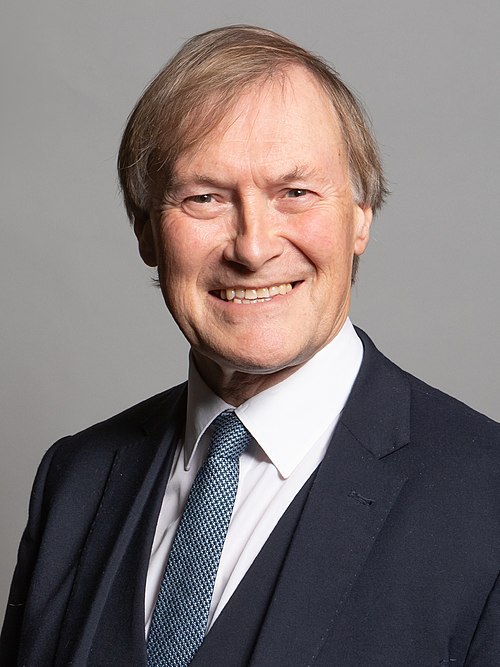
Image licensed under CC BY 3.0? by Richard Townshend
15th October 2018 🗓️ : Event - Kidnapping of Jayme Closs
Thirteen-year-old Jayme Closs was kidnapped from her home in Barron, Wisconsin, and held captive for 88 days.
"On October 15, 2018, 21-year-old Jake Thomas Patterson abducted 13-year-old Jayme Lynn Closs from her family's home in Barron, Wisconsin. The attack took place at 12:53 a.m. after he forced his way inside and fatally shot her parents. Patterson took Closs to a house 70 miles (110 km) away in rural..."
15th October 2013 🗓️ : Event - 2013 Bohol earthquake
A 7.2-magnitude earthquake struck Bohol in the Philippines, resulting in 222 deaths.
"The 2013 Bohol earthquake occurred on October 15 at 8:12:31 PST in Bohol, an island province located in Central Visayas, Philippines. The magnitude of the earthquake was recorded at Mw 7.2, with epicenter 6 kilometres (3.7 mi) S 24° W of Sagbayan, and its depth of focus was 12 kilometres (7.5 mi)...."
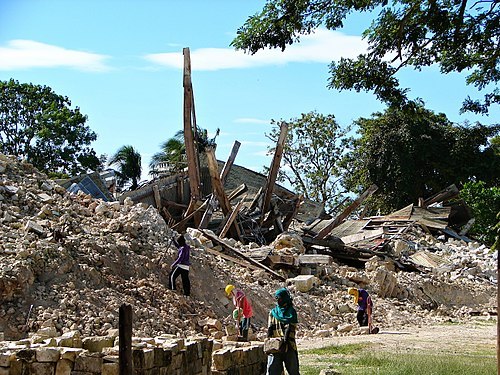
Image licensed under CC BY-SA 3.0? by P199
15th October 1973 🗓️ : Birth - Aleksandr Filimonov
Aleksandr Filimonov, Russian footballer
"Aleksandr Vladimirovich Filimonov (Russian: Александр Владимирович Филимонов; born 15 October 1973) is a former association football goalkeeper from Russia. He won the 2011 FIFA Beach Soccer World Cup with the Russia national beach soccer team.During his professional career, he was best known for..."
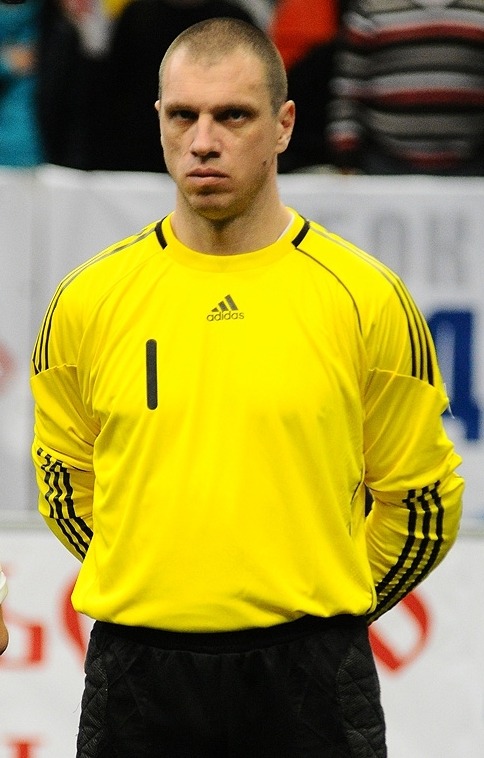
Image licensed under CC BY-SA 1.0? by Dmitry Parshin
15th October 1923 🗓️ : Event - Rentenmark
The German Rentenmark is introduced in Germany to counter hyperinflation in the Weimar Republic.
"The Rentenmark (German: [ˈʁɛntn̩maʁk] ; RM) was a currency issued on 15 October 1923 to stop the hyperinflation of 1922 and 1923 in Weimar Germany, after the previously used "paper" Mark had become almost worthless. It was subdivided into 100 Rentenpfennig and was replaced in 1924 by the Reichsmark...."
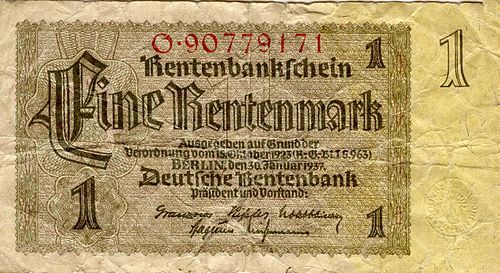
Image licensed under CC BY-SA 4.0? by Drrcs15
15th October 1820 🗓️ : Death - Karl Philipp, Prince of Schwarzenberg
Karl Philipp, Prince of Schwarzenberg (b. 1771)
"Karl Philipp, Fürst zu Schwarzenberg (or Charles Philip, Prince of Schwarzenberg; 18/19 April 1771 – 15 October 1820) was an Austrian Generalissimo and former Field Marshal. He first entered military service in 1788 and fought against the Turks. During the French Revolutionary War, he fought on the..."

Image by Unidentified painter
15th October 🗓️ : Holiday - Shwmae Su'mae Day (Wales)
"Shwmae Sumae Day (Welsh: Diwrnod Shwmae Sumae) is a day marked each year in Wales to celebrate and promote the Welsh language. Shwmae and Sumae are informal greetings used in the south and the north respectively to start a conversation. The day is celebrated on 15 October each year in order to..."
0 notes
Text
…So after a week and a half it’s finally happening! What a relief~
Today’s post will be mostly about nostalgia and contemplation since I keep going back in my mind to those wonderful memories as it was a beginning of a new era in my life (of some sort).
It all started almost two years ago when the world seemed a little more stable and people could travel much more freely. That was the time when I was able to make a short three-day trip to… the Czech Republic!
Nowadays, this incredible country is a home for many monuments and treasures of the imperial past, Holy Roman or Austrian or Austrian-Hungarian imperial past in particular. At some point different noblemen who served the monarchs of those immense Empires were able to get some kind of property there: were they lands, castles or even entire cities…
That’s where the history of House Schwarzenberg shines out the most! ✨
And here is their majestic coat of arms. 🛡

Actually, this noble House was one of the richest Houses in the Empire: they had possessions in Franconia (a historical region in Germany part of which is located in modern day Bavaria (from here actually came their progenitor - the first bearer of the title “Herr zu Schwarzenberg”)), Bohemia (an ancient kingdom which is a part of modern day Czech Republic) and Austria itself! 🇩🇪🇨🇿🇦🇹
Thanks to incredibly beneficial marriages and personal contribution to the glory of the Empire, their fortune grew immensely over time. As usual it was transferred into property, mostly acquired by them in Bohemia. That’s probably why the descendants of this House are considered today more Czechs than anyone else.
(Well, during his lifetime the nowadays head of the House, politician Karel Schwarzenberg, former prime minister of the Czech Republic, continued living between Czechia and Austria because, you know, political reasons… but anyway!)
And as Prague already is one of the most mesmerising cities I’ve ever visited, it was even more fascinating to discover all the magnificent palaces which once belonged to the representatives of the family. So it starts with the Schwarzenberský Palác in the heart of the capital…




…goes to the streets of a small town Český Krumlov in the southern Czechia where the family usually resided when they weren’t living in Vienna…


…continues with the breathtaking sight of the castle Hluboká nad Vltavou, the main familial residence…

…and ends near the robust walls of Orlík (or “Worlik” in German) nad Vltavou, the castle whose most famous owner was one Austrian field-marshal, diplomat and Hofkriegsrath President, Karl Philipp zu Schwarzenberg. :)

He was the main reason why I chose that long tour (even though back then I knew practically nothing about him, his deeds and that important Austrian “piece” of Napoleonic “pie” in general) and why I slowly fell for Austrian history.
(Well, actually, I also read my first biography of Metternich on the same trip and from that point it all got “worse” eventually! 😂)
Soooo now I simply sit here with this very straight-forward, not very talented but good-hearted man on my hands and feel somehow… blessed.
It’s an incredible feeling actually. ❤️

P.S.
After all this time the only thing I feel regret for is my inability to explore all those fascinating sights much more carefully back then. Unfortunately, I had almost no time at all and the season was rather unsuitable (all the palaces are closed from late autumn to early spring since it’s an enormous task to keep the right temperatures inside of those immense buildings) …
I guess, from now on it’s a dream I want to fulfil one day - a long stay in Czechia with an opportunity to visit all the museums and palaces which once belonged to Schwarzenberg’s family. :)
#count’s drawings#art#napoleonic wars#napoleonic era#house schwarzenberg#schwarzenberg#fürst zu schwarzenberg#karl zu schwarzenberg#czech republic#austrian empire#austrian history#czech history#19th century
31 notes
·
View notes
Text
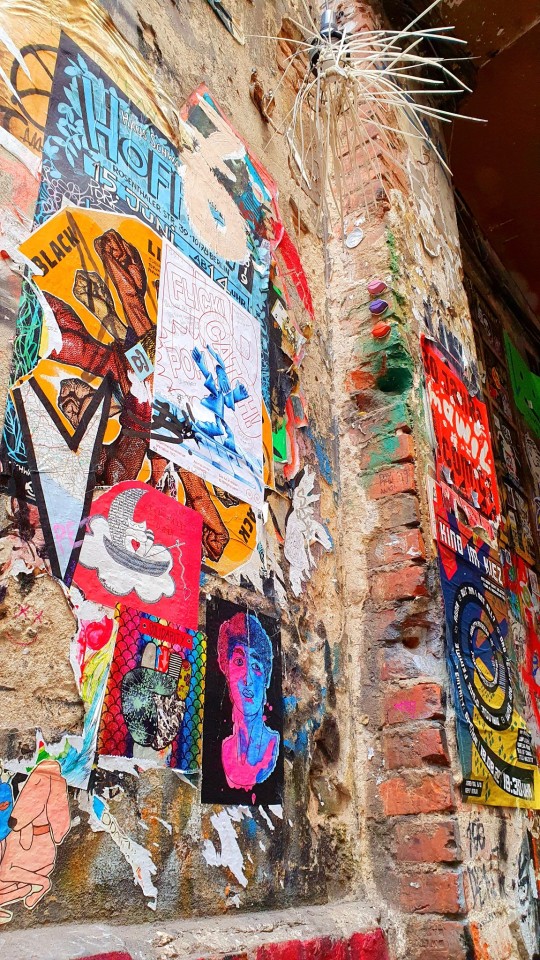
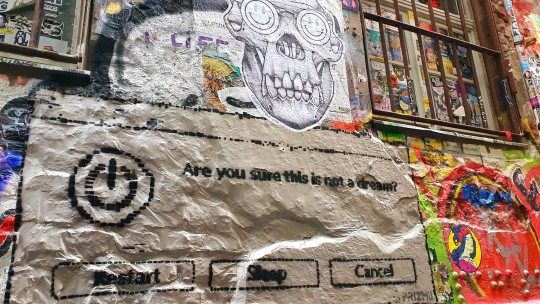
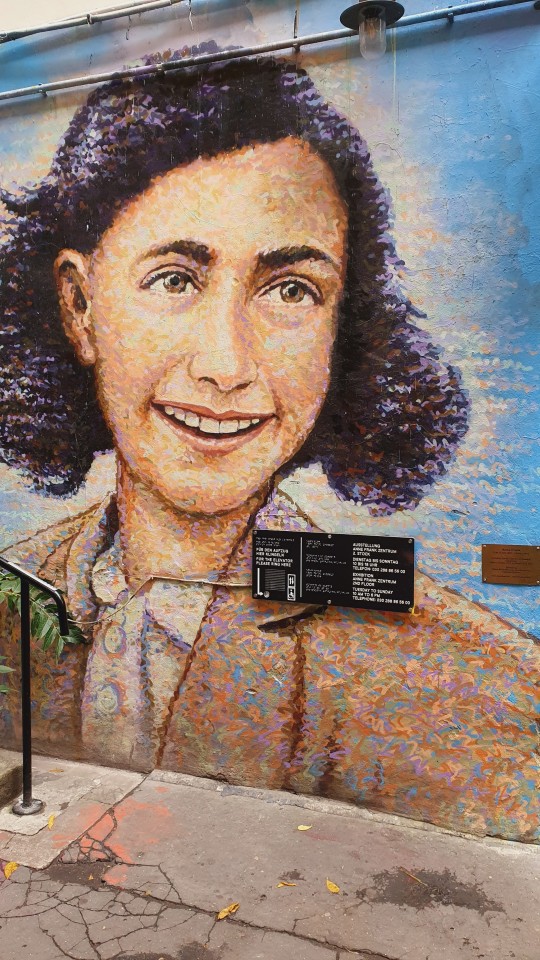

Haus Schwarzenberg, Berlin
© Sven Wabersitzky
#haus schwarzenberg#berlin#mitte#photography#own photography#art#house#gallery#neurotitan#illustration#sw artstuff#own#street art#trip#anne frank zentrum#sven wabersitzky#photographer
2 notes
·
View notes
Photo

40 notes
·
View notes
Text
Ok so for @intercolorum and @lizisanamimal a few Austrian/German noble houses I had on my long long long list (titles may not be exact, this is just from my notes): Princess Alexandra von Wrede, Archduchess Maria Constanza, Princess Sandra of Saxony, Thyra von Westernhagen, Princess Diana of Schwarzenberg, Duchess Mathilde von Württemberg






And of course can’t forget Gloria TNT

16 notes
·
View notes
Text
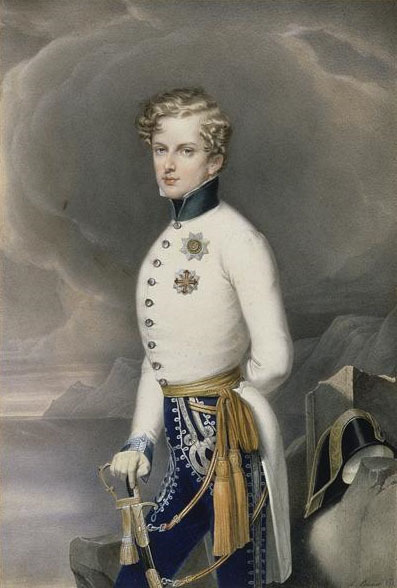
These are excerpts from »Mein Verhältnis zum Herzog von Reichstadt« by Ritter Anton Prokesch von Osten. This gentleman, fifteen years older than Franz von Reichstadt and apparently a bit of an adventurer but with excellent diplomatic skills, had made a name for himself in fighting for the unification of Greece and in the Levante, services for which he had recently been knighted. He had also, already in his youth, written several books full of appraisal for Napoleon, one about the battle of Waterloo. Recently returned to Austria, he was staying in Graz in June 1830, when he first made the acquaintance of the Duke of Reichstadt:
At that time the court also went there and on the 22nd I had the honour of being called to the imperial table. I sat opposite the Empress and had the Duke of Reichstadt, who sat opposite the Emperor, at my side. […]
Okay, let’s just stop here already for a second. So, at this official court event Franz sits
at the family table
and vis-à-vis his grandfather the Emperor (a place of honour).
This does not sound like isolation or mistreatment to me. In a letter to Austrian politician Gentz Prokesch even mentions that the evening before, when the emperor and his family appeared at the theater, the Duke of Reichstadt had been greeted by some with shouts of »Vivat Napoleon«. And this, as Prokesch states, »quite innocently«, i.e., without giving it much thought. Apparently nobody bothered about political implications.
During the imperial dinner that Prokesch was invited to, he did not have much occasion to chat with Franz, for once because arch-duke Johann talked too much, but also because Franz definitely held back at this public occasion and was not very approachable. He did shake Prokesch’s hand however, when Prokesch took his leave, and told him that he had known him for a long time already (i.e., that he had read his books).
On the morning after this day, Count Moritz Dietrichstein, who had been entrusted with the Duke's education, and a man who had been well-disposed towards me from the time when I had been carried by the favour of the House of Prince Schwarzenberg, came to me in order to renew the complaint he had already levelled at me yesterday, namely that, although I had been in the same city with the Duke for a week, I had neglected him. He invited me to go straight to him.
So, let’s recapitulate: The evil obusive reactionary instructor himself calls upon a known admirer of Napoleon in order to get him to make the acquaintance of his student.
I followed him with pleasure. When I entered, the Duke, a different man in his bearing from the day before, met me with all the swiftness of youth and with an expression full of confidence and warmth. Repeating the words of yesterday, he said: "I have known you and loved you for a long time. You have defended my father's honour at a time when all was racing to scorn him. I have read your Battle of Waterloo and, in order to absorb every line in it, I have translated it twice into other languages, into French and Italian." I answered what the desire to captivate the handsome young man, so unique in the world, made me say. Count Dietrichstein first brought the conversation to Greece. Full of best wishes for this country now called to its own life, I had already expressed the opinion yesterday, after the imperial dinner, that despite the evils arising from war, lawlessness, factionalism and misgovernment, Greece would quickly blossom into a happy future if a European prince was given to it as king and if it were not governed with diplomatic half-measures. To the Archduke Johann, to Count Moritz [i.e. Dietrichstein], to the principal of the Archduchess Marie Luise, to Colonel von Werklein, I had, at a moment when the Duke was otherwise engaged, suggested that the Greek throne, which had lacked a claimant since the rejection of the Prince of Coburg, could be given to no one more worthy than the son of Napoleon, and to my surprise this suggestion had met with applause. Even the Empress, who had come to us during this conversation, did not seem averse to it. [...]
Now Count Dietrichstein turned the conversation onto Napoleon.
Again: It is Dietrichstein himself who brings in the alleged hot potato. And apparently, Franz has no fear to talk about the topic in his governor’s presence:
The Duke spoke in great excitement. - The warmest admiration for his father, the most passionate attachment was in the Duke's every word. But he dwelt chiefly on the latter's military talents. To train himself as a general according to this pattern was something he was passionate about down to his fingertips. We discussed several of his manoeuvres, for example that of Austerlitz. I was amazed at the Prince's strategic judgement and the firmness of his expression. Among all the officers and generals present in Graz at that time, there was certainly not one with such a sharp military eye and so resolute a disposition towards the commander. He came back to my Battle of Waterloo, but also to my "Memories from the Life of Field Marshal Prince Karl zu Schwarzenberg". The Duke discussed these with a tact that surprised me. He then complained about his loneliness and burst into the words: "Stay with me! Make the sacrifice of your future, stay with me! We, we would understand each other!" He spoke this with a warmth that penetrated my heart. Then he continued: "If it is my destiny to become a Prince Eugene for Austria, I ask myself how to train myself for this role? I have to choose a man who can introduce me to the higher demands and tasks of war; I have and see no such man in my surroundings." Count Dietrichstein witnessed this statement and seemed to find it natural and approve of it.
Dietrichstein then leaves the two to themselves for a while, and Franz noticeably opens up even more and talks about his present situation at court and his plans for the future.
"[...] If it is my doom never to return to France, I am serious about my desire to become another Prince Eugene for Austria. I love my grandfather - I am a piece of his house and will gladly draw the sword for Austria against anyone but France." He laid down these words like a confession in my soul, and so I took them.
A bit later, Prokesch repeats how close the relationship between Reichstadt and his grandfather was:
[...] He loved his grandfather with the love of a child, for from the day he was brought to Vienna he had found in him the tenderness of a father. At that time he was given a playground in the emperor's rooms - did not leave his side for half a day, ate with him when the emperor ate alone, shared his stays in the country with him and grew up with him like a branch grafted onto a foreign trunk. He told me this, but added: that he would not forget for a moment who he was born and where his father was decaying. […]
Again – this does not sound like »isolation« to me.
Out of interest to those who are familiar with the books by Aubry and Castelot: How do they treat these informations? I understand Prokesch is generally accepted as one of Reichstadt's true friends? Or is there reason to question the truth of his statements?
I guess what I'm trying to say is: Let's be fair and hear both sides before jumping to conclusions. Just because Dietrichstein was – by modern standards – a horrible pedagogue does not mean he was automatically wrong in his assessment of Franz’s character traits. Proksch actually seems to confirm some of it. Just because »l’Aiglon« had a tragic fate does not mean he was automatically a saint.
43 notes
·
View notes